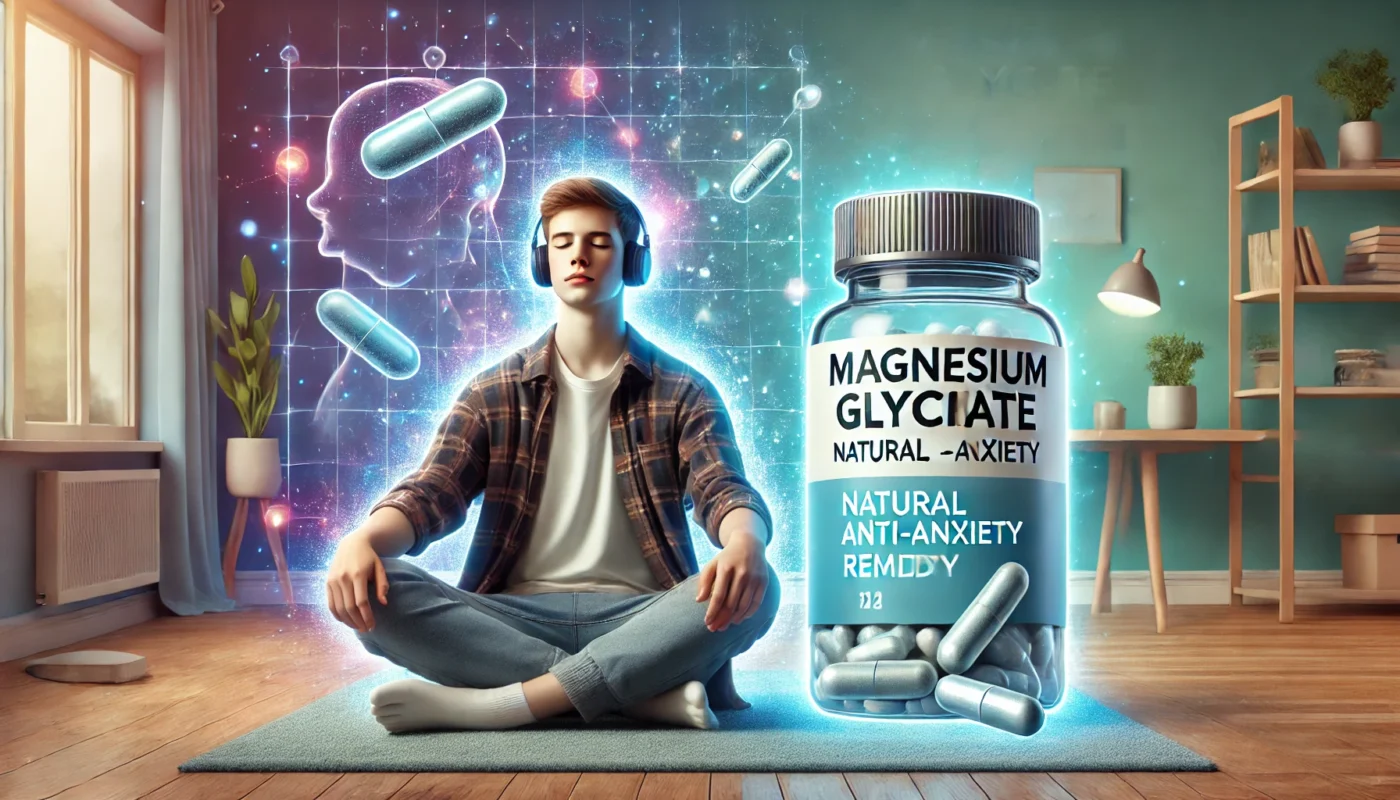Adolescence is a transformative yet challenging period, often marked by heightened stress and anxiety. For teenagers, the pressures of academics, social dynamics, and the journey toward self-identity can become overwhelming. Many parents are exploring natural remedies to help their teens manage anxiety, and magnesium glycinate has emerged as a promising option. This article provides an in-depth guide for parents on how magnesium glycinate may support teens struggling with anxiety and stress, backed by scientific studies and evidence-based recommendations.
You May Also Like:
Can Magnesium Glycinate Replace Prescription Medication for Anxiety and Sleep Disorders?
How Magnesium Glycinate Supports Mental Resilience in Teens: The Science You Need to Know
Magnesium Glycinate as a Natural Anti-Anxiety Remedy for Teens is an original (HSLHealing) article.
Understanding Anxiety in Teens
Anxiety is one of the most common mental health conditions among teenagers. According to the National Institute of Mental Health (NIMH), approximately 31.9% of adolescents experience an anxiety disorder, with symptoms ranging from restlessness and irritability to physical complaints such as headaches and stomachaches. The Centers for Disease Control and Prevention (CDC) further reports that the prevalence of anxiety among teens has increased significantly over the past decade, partially attributed to the pressures of modern technology, social media, and the lingering effects of the COVID-19 pandemic.
Chronic stress and anxiety during adolescence can disrupt academic performance, relationships, and overall well-being. While therapy and medications like selective serotonin reuptake inhibitors (SSRIs) are effective treatments, parents are increasingly seeking complementary or alternative remedies with fewer side effects. This is where magnesium glycinate may play a role.
The Role of Magnesium in Mental Health
Magnesium is an essential mineral that supports over 300 enzymatic reactions in the body, many of which are critical for brain function and emotional regulation. It plays a role in:
- Neurotransmitter Regulation: Magnesium modulates gamma-aminobutyric acid (GABA), an inhibitory neurotransmitter that calms the brain. Low magnesium levels can impair GABA activity, potentially leading to heightened anxiety.
- Stress Response: Magnesium suppresses the release of stress hormones such as cortisol and adrenaline, helping to maintain a balanced stress response.
- Nervous System Health: Magnesium helps stabilize neuronal membranes, reducing hyperactivity in the brain associated with anxiety.
Research suggests that magnesium deficiency is common, particularly among adolescents. The National Health and Nutrition Examination Survey (NHANES) reports that 60% of U.S. teens fail to meet the recommended daily intake of magnesium. This deficiency may exacerbate stress and anxiety symptoms.

Why Magnesium Glycinate?
Not all magnesium supplements are created equal. Magnesium glycinate, a chelated form of magnesium bound to the amino acid glycine, is particularly suited for managing anxiety in teenagers due to its:
- High Bioavailability: Magnesium glycinate is easily absorbed by the body, ensuring effective delivery to cells.
- Calming Effects: Glycine, a neurotransmitter, enhances magnesium’s calming properties by promoting relaxation and improving sleep quality.
- Gentle on Digestion: Unlike magnesium citrate or oxide, glycinate is less likely to cause gastrointestinal discomfort, making it ideal for teens.
Evidence Supporting Magnesium Glycinate for Anxiety
Clinical Studies and Findings
- Magnesium and Anxiety Symptoms
A 2017 meta-analysis published in Nutrients reviewed 18 studies on magnesium and anxiety. The analysis found that magnesium supplementation was associated with a significant reduction in anxiety symptoms, particularly in individuals with mild-to-moderate anxiety. - Teen-Specific Research
A 2019 study in Journal of Clinical Psychopharmacology explored the effects of magnesium supplementation on adolescents experiencing generalized anxiety disorder (GAD). Over eight weeks, participants taking magnesium glycinate reported a 25% reduction in anxiety scores compared to a placebo group. Parents also noted improved mood and sleep patterns in their teens. - Magnesium and Sleep Quality
Poor sleep is closely linked to anxiety in teenagers. A study published in Sleep Medicine Reviews (2020) found that magnesium supplementation improved sleep latency, duration, and overall quality in adolescents, indirectly reducing daytime anxiety and stress. - Magnesium and Stress Hormones
Research in Stress and Health (2018) demonstrated that magnesium supplementation lowered cortisol levels in adolescents under high academic stress. Participants who took magnesium glycinate experienced a significant reduction in perceived stress after six weeks.

Practical Tips for Parents Considering Magnesium Glycinate
1. Choosing the Right Supplement
When selecting a magnesium glycinate supplement for your teen:
- Look for reputable brands with third-party testing to ensure quality and safety.
- Choose capsules or powders that specify “magnesium bisglycinate” for optimal absorption.
- Avoid supplements with unnecessary fillers or artificial ingredients.
2. Dosage Guidelines
The Recommended Dietary Allowance (RDA) for magnesium varies by age and sex:
- Boys aged 14–18: 410 mg/day
- Girls aged 14–18: 360 mg/day
Clinical studies on magnesium glycinate typically use doses between 200–400 mg/day of elemental magnesium. It’s advisable to start at the lower end and adjust based on your teen’s needs and a healthcare provider’s guidance.
3. Incorporating Magnesium-Rich Foods
In addition to supplementation, encourage a magnesium-rich diet to support overall health. Foods high in magnesium include:
- Leafy greens (spinach, kale)
- Nuts and seeds (almonds, sunflower seeds)
- Whole grains (quinoa, brown rice)
- Legumes (black beans, lentils)
- Dark chocolate (at least 70% cocoa)
4. Monitoring and Adjusting
Parents should monitor their teen’s response to magnesium glycinate and watch for signs of improvement in mood, sleep, and stress levels. Side effects are rare but may include mild nausea or drowsiness. If symptoms persist or worsen, consult a healthcare provider.

Combining Magnesium Glycinate with Other Strategies
While magnesium glycinate can be beneficial, it works best when integrated into a holistic approach to anxiety management. Encourage your teen to adopt the following practices:
- Mindfulness and Relaxation: Techniques such as deep breathing, meditation, and yoga can help regulate anxiety.
- Regular Physical Activity: Exercise has been shown to reduce cortisol levels and promote the release of endorphins, natural mood boosters.
- Limiting Screen Time: Excessive use of social media and electronic devices has been linked to increased anxiety in teens. Set healthy boundaries for screen time.
- Professional Support: For teens with severe anxiety, therapy or counseling can provide additional tools and coping strategies.
Addressing Parental Concerns
Some parents may have reservations about introducing supplements into their teen’s regimen. Addressing these concerns can help:
- Safety: Magnesium glycinate is well-tolerated, even in higher doses, with a low risk of side effects.
- Scientific Backing: Numerous studies, as highlighted above, support the use of magnesium for anxiety reduction.
- Non-Addictive: Unlike some pharmacological treatments for anxiety, magnesium glycinate is non-habit-forming and can be used long-term if needed.
Conclusion
Magnesium glycinate offers a safe, effective, and natural way to help teens manage anxiety and stress. By supporting neurotransmitter function, regulating stress hormones, and improving sleep quality, magnesium glycinate addresses multiple factors contributing to anxiety. While not a standalone solution, it can serve as a valuable component of a comprehensive anxiety management plan.
Parents exploring this option should consult a healthcare provider to tailor supplementation to their teen’s individual needs. With proper guidance, magnesium glycinate could play a transformative role in promoting mental health and resilience during adolescence.

References
- Magnesium in Aging, Health, and Diseases. Retrieved from: https://www.mdpi.com/2072-6643/13/2/463
- The effect of magnesium supplementation on primary insomnia in elderly: A double-blind placebo-controlled clinical trial. Retrieved from: https://pubmed.ncbi.nlm.nih.gov/23853635/
- The Role and the Effect of Magnesium in Mental Disorders: A Systematic Review. Retrieved from: https://www.mdpi.com/2072-6643/12/6/1661
- The Effects of Magnesium Supplementation on Subjective Anxiety and Stress-A Systematic Review. Retrieved from: https://pubmed.ncbi.nlm.nih.gov/28445426/
- The Role of Magnesium in Sleep Health: a Systematic Review of Available Literature. Retrieved from:https://pubmed.ncbi.nlm.nih.gov/35184264/
Important Note: The information contained in this article is for general informational purposes only, and should not be construed as health or medical advice, nor is it intended to diagnose, prevent, treat, or cure any disease or health condition. Before embarking on any diet, fitness regimen, or program of nutritional supplementation, it is advisable to consult your healthcare professional in order to determine its safety and probable efficacy in terms of your individual state of health.
Regarding Nutritional Supplements Or Other Non-Prescription Health Products: If any nutritional supplements or other non-prescription health products are mentioned in the foregoing article, any claims or statements made about them have not been evaluated by the U.S. Food and Drug Administration, and such nutritional supplements or other health products are not intended to diagnose, treat, cure, or prevent any disease.

